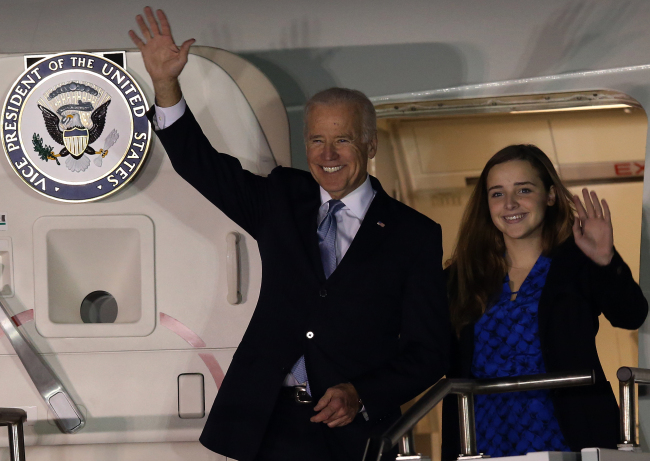Biden in Seoul to discuss China’s air zone
U.S. vice president calls on China to reduce tension
By Korea HeraldPublished : Dec. 5, 2013 - 20:14
U.S. Vice President Joe Biden arrived in Seoul Wednesday for a three-day visit for talks on concerns over China’s air defense zone, North Korea and other bilateral issues.

Biden flew to Seoul from Beijing, where he apparently failed to bridge differences with Chinese officials over Beijing’s unilateral declaration of its new air defense identification zone in the East China Sea, which overlaps with those of South Korea and Japan.
Biden is to meet President Park Geun-hye, Prime Minister Chung Hong-won and other top officials on Friday. Seoul plans to explain to him its desire to expand its own air defense zone.
Seoul plans to finalize its plan this week for the expansion to include Ieodo, a submerged rock in the overlapping exclusive economic zones of South Korea and China, which Beijing has incorporated in its new air zone.
“Ieodo is in the waters within South Korea’s jurisdiction, and South Korea has also established a maritime scientific research center there,” Defense Minister Kim Kwan-jin said during a parliamentary session Thursday. “Of course, South Korea should include Ieodo in its air defense identification zone.”
As well as Ieodo, Seoul is considering including the country’s southernmost island of Marado and Hongdo, an uninhabited island south of Geojedo. Set up by the U.S. Air Force during the Korean War in 1951, South Korea’s air zone does not cover some of its remote islands.
During his talks with Chinese President Xi Jinping, Biden expressed deep concerns that China’s new air rules calling for foreign aircraft to submit flight plans in advance could lead to an unnecessary confrontation and raise military tensions.
Xi reportedly reiterated China’s basic stance that its demarcation of the new air defense zone was part of its legitimate effort to ensure aerial defense.
During a meeting with dozens of U.S. business leaders in China on Thursday, Biden stressed that China should make efforts to reduce tensions and secure peace in the region.
“China’s recent and sudden announcement of the establishment of a new air defense identification zone has, to state the obvious, caused significant apprehension in the region,” he said.
“And I was very direct about our firm position and our expectations in my conversations with President Xi.”
During a press conference on Tuesday in Japan before traveling to China, Biden also highlighted the U.S. concerns over China’s new air rules, which Seoul, Washington and Tokyo have refused to recognize.
“We, the U.S., are deeply concerned by the attempt to unilaterally change the status quo in the East China Sea,” said Biden.
A major U.S. concern is that an ascendant China seeks to unilaterally revise the established norms and rule-based order in the region, particularly in the maritime domain where rich resources are buried and vital sea lanes of communication converge.
During a press briefing, U.S. Defense Secretary Chuck Hagel also expressed concerns over China’s unilateral move.
“It’s not that the ADIZ itself is new or unique. The biggest concern that we have is how it was done so unilaterally and so immediately without any consultation or international consultation. That’s not a wise course of action to take for any country,” he said.
While Biden is here in Korea, he is also to discuss a set of other bilateral issues with Seoul officials. The issues are expected to include Japan’s pursuit of the right to collective self-defense ― the use of military force against an attack on its ally, namely the U.S.
Washington has supported Japan’s pursuit of the right, while Seoul remains cautious as public sentiment has deteriorated against any military move by Japan, which colonized the Korean Peninsula from 1910-45.
During his stay in Korea, Biden is to deliver a policy speech at Seoul’s Yonsei University on Friday and visit the Demilitarized Zone, a buffer zone dividing the two Koreas, on Saturday.
By Song Sang-ho (sshluck@heraldcorp.com)
-
Articles by Korea Herald








![[Graphic News] More Koreans say they plan long-distance trips this year](http://res.heraldm.com/phpwas/restmb_idxmake.php?idx=644&simg=/content/image/2024/04/17/20240417050828_0.gif&u=)
![[KH Explains] Hyundai's full hybrid edge to pay off amid slow transition to pure EVs](http://res.heraldm.com/phpwas/restmb_idxmake.php?idx=644&simg=/content/image/2024/04/18/20240418050645_0.jpg&u=20240419100350)






![[From the Scene] Monks, Buddhists hail return of remains of Buddhas](http://res.heraldm.com/phpwas/restmb_idxmake.php?idx=652&simg=/content/image/2024/04/19/20240419050617_0.jpg&u=20240419175937)

![[KH Explains] Hyundai's full hybrid edge to pay off amid slow transition to pure EVs](http://res.heraldm.com/phpwas/restmb_idxmake.php?idx=652&simg=/content/image/2024/04/18/20240418050645_0.jpg&u=20240419100350)

![[Today’s K-pop] Illit drops debut single remix](http://res.heraldm.com/phpwas/restmb_idxmake.php?idx=642&simg=/content/image/2024/04/19/20240419050612_0.jpg&u=)